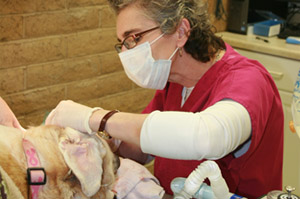Dentistry
 Dental cleanings, tooth extractions and minor oral surgeries are among the most commonly performed procedures in our clinic. Not surprising, since it is estimated over 85% of dogs and cats over four years of age have some degree of dental disease.
Dental cleanings, tooth extractions and minor oral surgeries are among the most commonly performed procedures in our clinic. Not surprising, since it is estimated over 85% of dogs and cats over four years of age have some degree of dental disease.
We know that tarter and calculus form continuously on unbrushed teeth, allowing bacteria to cause inflammation of the gums and breakdown of the periodontal ligament. This can result in a constant release of bacteria into the bloodstream, adversely affecting internal organs such as the heart, liver, and kidneys. Not only that, your pet's dental disease subjects you to unpleasant breath and your pet to constant, chronic pain. Because most dogs and cats continue to eat, they truly "suffer in silence."
Our complete dental care starts with the physical exam, where we can really only assess dental disease "above the gum line." If we do see plaque and inflammation of the gums however, almost assuredly there is inflammation and disease below the gum line. This is why when doing a thorough dental evaluation and cleaning your pet must be under a general anesthesia and a set of dental x-rays taken.
We use an ultrasonic dental scaler similar to that used by your own dentist to clean each tooth surface as well as below the gum line. In the same manner as your dental hygienist does, each tooth is then probed for pockets and "root planed" to thoroughly clean them. It is then determined whether broken, loose, and infected teeth are best treated by extraction, which is surgically performed if indicated. The teeth are polished with a fine pumice to create a smooth surface. Your pet is then sent home with antibiotics and pain medications if warranted.
One to two weeks after the procedure we follow up with a no-charge recheck of the mouth where we demonstrate at-home care so you can maintain his healthy mouth and sweet breath!
